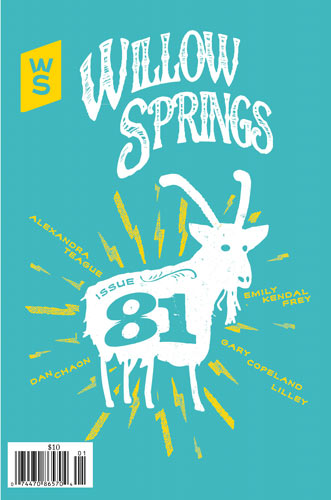Willow Springs – Spring 2018
Aqua, white, and yellow, the cover of Willow Springs 81 is built around Chris Bovey’s silkscreened “Garbage Goat,” a tribute to a local Spokane bovidae. The colors, the image, the typography itself evince freshness, a liveliness that portends well for the content within. Published twice yearly, Willow Springs is funded in part by the MFA program at Eastern Washington University, though its contributors come from all over the country.
Aqua, white, and yellow, the cover of Willow Springs 81 is built around Chris Bovey’s silkscreened “Garbage Goat,” a tribute to a local Spokane bovidae. The colors, the image, the typography itself evince freshness, a liveliness that portends well for the content within. Published twice yearly, Willow Springs is funded in part by the MFA program at Eastern Washington University, though its contributors come from all over the country.
The poetry of Issue 81 is strong. Susan Moore begins with the words, “I wanted to lie down with you where the rooftops / dissolved if we stared long enough,” setting the scene for an abstract relationship laced with enticements and incarnations, the desire to unmake. In an excerpt from “Leafmold,” F. Daniel Rzicznek writes, “You sort through the congealed / dreams, tumbling some smooth in one hand while your / other grips the rope to the surface.” Later, in her second contribution, Susan Moore writes, “I want to be known, like a recipe carried through the years.” Everywhere, animals are going extinct, but in a hundred years, she writes, “who will recognize me— / my mouth, my neck, that place between my legs.”
Sean Lovelace’s letters to Jim Harrison, four of which are published in the issue, are made up of moving and amusing moments detailing certain subjects: the election, Hemingway, flies or David Foster Wallace, and drinking with linguists. In “Letter to Jim Harrison #6,” the Hemingway piece, a student details a poetry reading in which she repeatedly chanted, “‘Ice, ice, ice, ice . . . ’ Then moments later opened her empty palms and waved them in conclusion: ‘Water.’” Funny, removed, or melancholy in moments, the poems evoke a powerful mood built from a host of quirky, low-key lines.
“Saturday Night Special” by J. Stillwell Powers is the story of Preston, the young son of an addict growing up on a rundown farm. Preston’s mom has taken off with a cordless drill, a Skilsaw, and a generator to pawn or otherwise sell for her “medicine.” She’s been gone a week when Preston’s uncle Eli puts on a dog fight to raise money to fix the farmhouse’s busted roof. Despite the family’s hard-luck story and the uncertain future of Preston—a boy who is learning all the wrong lessons—the emotional weight of the piece rests in the kennels of the maimed and murdered dogs, trained, doped, and savaged for the amusement of some two-dozen men. The question is less “if” than “when” this hardscrabble world will stamp out Preston’s aspirations, the sweet qualities that make him a worthy human.
Gary Copeland Lilley’s interview is something else, touching on his own history, the wider history of oppression, and literary technique. He argues that poetry can be partly political, but the politics must always take a back seat to the art. He also knocks the false division of written “literature” and spoken “street poetry,” noting that poems must have a “sonic quality.” “You want to hear it,” he says. Far beyond little literary spats is a larger cultural malaise that Lilley is keen to address. Moving from the Wilmington Massacre of 1898 to present day oppression, he states, “But here’s the funny thing. For people who have always had privilege, equality is oppression. That’s how they saw it. How they’re seeing it today.”
Issue 81 is slim, but the work within is at once heavy and light, introspective and wild. Humor becomes sorrow becomes a punch line becomes a moment for reflection. In this way the stories and poems reflect life itself. Spring is here. As white gives way to green, leaf through these pages, and wave hello to the garbage goat if you have a hand to spare.
[willowspringsmagazine.org]





